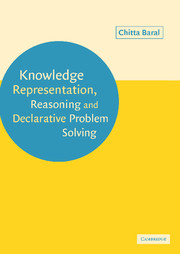Book contents
- Frontmatter
- Contents
- Preface
- 1 Declarative programming in AnsProlog*: introduction and preliminaries
- 2 Simple modules for declarative programming with answer sets
- 3 Principles and properties of declarative programming with answer sets
- 4 Declarative problem solving and reasoning in AnsProlog*
- 5 Reasoning about actions and planning in AnsProlog*
- 6 Complexity, expressiveness, and other properties of AnsProlog* programs
- 7 Answer set computing algorithms
- 8 Query answering and answer set computing systems
- 9 Further extensions of and alternatives to AnsProlog*
- Appendix A Ordinals, lattices, and fixpoint theory
- Appendix B Turing machines
- Bibliography
- Index of notation
- Index of terms
7 - Answer set computing algorithms
Published online by Cambridge University Press: 13 August 2009
- Frontmatter
- Contents
- Preface
- 1 Declarative programming in AnsProlog*: introduction and preliminaries
- 2 Simple modules for declarative programming with answer sets
- 3 Principles and properties of declarative programming with answer sets
- 4 Declarative problem solving and reasoning in AnsProlog*
- 5 Reasoning about actions and planning in AnsProlog*
- 6 Complexity, expressiveness, and other properties of AnsProlog* programs
- 7 Answer set computing algorithms
- 8 Query answering and answer set computing systems
- 9 Further extensions of and alternatives to AnsProlog*
- Appendix A Ordinals, lattices, and fixpoint theory
- Appendix B Turing machines
- Bibliography
- Index of notation
- Index of terms
Summary
In this chapter we discuss four algorithms for computing answer sets of ground AnsProlog* programs. The first three algorithms compute answer sets of ground AnsProlog programs while the fourth algorithm computes answer sets of ground AnsPrologor programs. In Chapter 8 we will discuss several implemented systems that compute answer sets and use algorithms from this chapter.
Recall that for ground AnsProlog and AnsPrologor programs π answer sets are finite sets of atoms and are subsets of HBMπ. In other words answer sets are particular (Herbrand) interpretations of π which satisfy additional properties. Intuitively, for an answer set A of π all atoms in A are viewed as true with respect to A, and all atoms not in A are viewed as false with respect to A. Most answer set computing algorithms – including the algorithms in this chapter – search in the space of partial interpretations, where in a partial interpretation some atoms have the truth value true, some others have the truth value false and the remaining are considered to be neither true nor false. In the first three algorithms in this chapter the partial interpretations are 3-valued and are referred to as 3-valued interpretations, while in the fourth algorithm the partial interpretation that is used is 4-valued. Recall that we introduced 3-valued interpretations in Section 6.6.9, and that in 3-valued interpretations the atoms which are neither true not false have the truth value unknown.
- Type
- Chapter
- Information
- Publisher: Cambridge University PressPrint publication year: 2003



